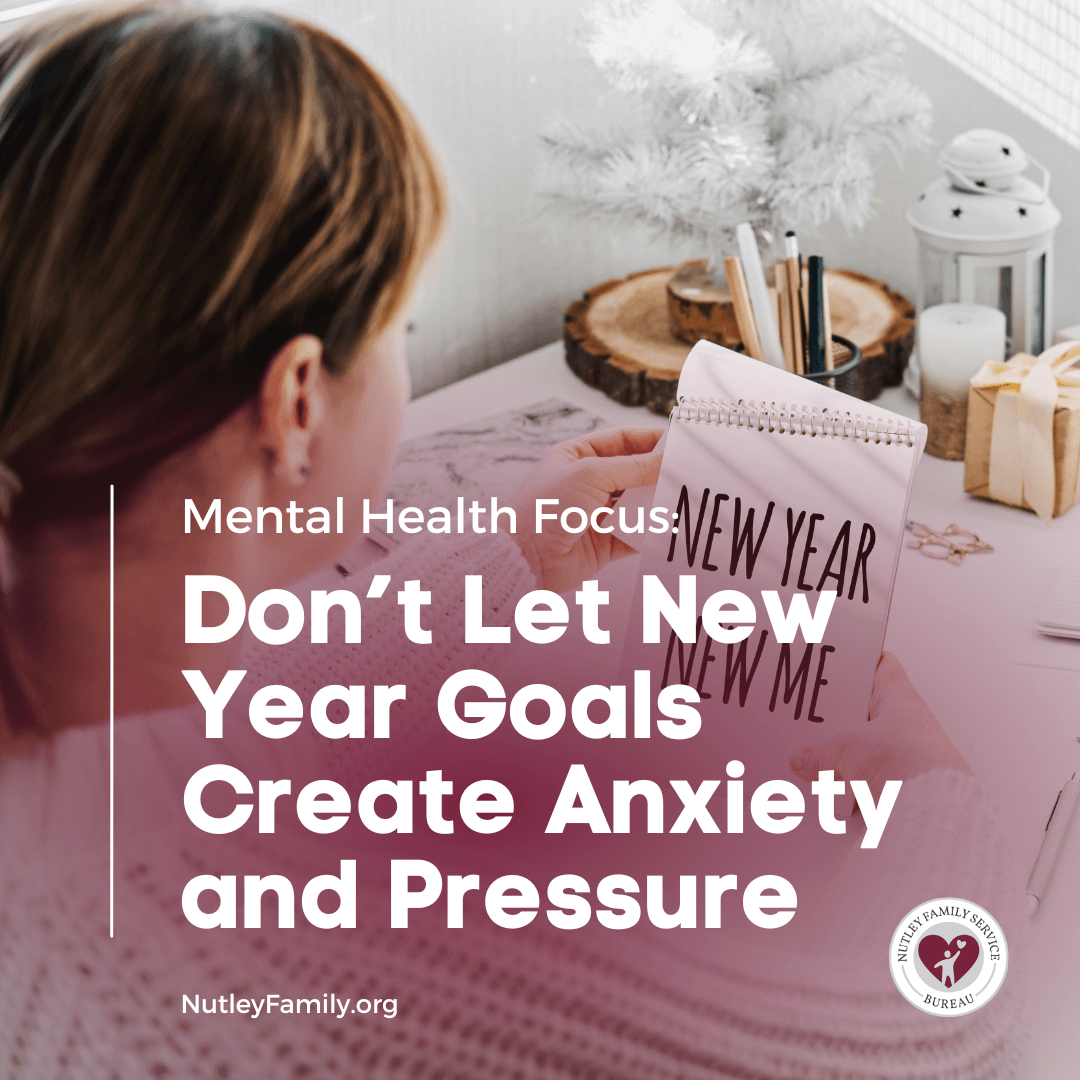-
Mental Health Focus: Don’t Let New Year Goals Create Anxiety and Pressure
- Posted on January 22, 2024
- by admin
- in Mental Health, NFSB Blog
- Comments Off on Mental Health Focus: Don’t Let New Year Goals Create Anxiety and Pressure

The Mental Health Program at Nutley Family Service Bureau (NFSB) provides counseling and psychiatric services for individuals and families. New clients are welcome and immediate appointments are available. This article is part of an ongoing educational series focused on common mental health challenges, treatment techniques, and helpful tips.
The New Year is a time for many to reflect on the past year and look forward to new beginnings. It’s an opportunity to get a fresh start with a clean slate. New goals are established as people seek positive changes in their lives.
Although this period of reflection and goal setting is typically well-intentioned, it can lead to feelings of anxiety, disappointment, and even shame.
“I see this a lot, especially with younger adults in college and in their 20s,” said Kelly Rivadeneyra, LCSW, Assistant Director of the Mental Health program at NFSB. “I’ve found that people tend to feel that they haven’t accomplished enough in the past year, or they psych themselves out about the year to come and what needs to be done to achieve their goals.”
Feeling pressure to succeed and fear of failure can also lead to negative self-talk. In other words, people focus on what they think they’ve done wrong and what will happen if they don’t achieve their goals, which can affect their self-esteem and confidence.
Getting to the Root Causes of New Year Anxiety and Pressure
“There’s a phrase that says, ‘New year, new me,’” Kelly said. “This can apply a negative connotation that the old me isn’t good enough and creates pressure before you even start the process of setting and achieving goals. As a result, people often use self-criticism or even self-shame as a motivator, which can cause internal harm to self-esteem.”
To be clear, setting and achieving goals can be a very positive experience. It can build confidence, provide a sense of purpose and direction, and potentially improve a person’s well-being. Problems arise when people are too hard on themselves and overlook smaller accomplishments in their lives.
“We need to ask ourselves who our goals are really for,” Kelly said. “Am I setting goals because some sort of external force has expressed that I need to reach those goals? Am I seeking external validation, or are these goals meaningful to me? These are important questions to ask when setting goals, especially at this time of year.”
Setting Goals that Promote Positive Mental Health
What goals would make you happy if you could achieve them? Think about goals that are not only meaningful to you, but also reasonable and achievable.
“We often start with big, lofty dreams that lead to disappointment and a sense of failure,” Kelly said. “The problem is that these goals were never realistic in the first place. Starting smaller and focusing on positive habits instead of numbers can boost your self-esteem and confidence. Give yourself credit for the progress you make, and practice self-care and self-kindness.”
Most people need support on their journey to achieving goals for the New Year. If you feel pressure, anxiety, or defeated, schedule an appointment at NFSB. We can help you identify and process the root causes of negative feelings, learn coping skills and behavior changes, and make goal setting a more rewarding experience!Don’t assume the challenges you’re facing “aren’t serious enough” to warrant counseling. We’re here to help. If you or someone you know needs support to get through a difficult time, schedule an appointment at NFSB. New clients are welcome and immediate appointments for mental health counseling are available. Call 973-667-1884 extension 1.
If you enjoyed this article please consider sharing it!
Archives
- July 2024
- June 2024
- May 2024
- April 2024
- March 2024
- February 2024
- January 2024
- December 2023
- November 2023
- September 2023
- August 2023
- July 2023
- June 2023
- May 2023
- April 2023
- March 2023
- February 2023
- January 2023
- December 2022
- November 2022
- October 2022
- September 2022
- August 2022
- July 2022
- June 2022
- May 2022
- April 2022
- March 2022
- February 2022
- January 2022
- December 2021
- November 2021
- October 2021
- September 2021
- August 2021
- July 2021
- June 2021
- May 2021
- April 2021
- March 2021
- January 2021
- December 2020
- November 2020
- October 2020
- September 2020
- August 2020
- July 2020
- June 2020
- May 2020
- March 2020
- January 2020
- November 2019

















